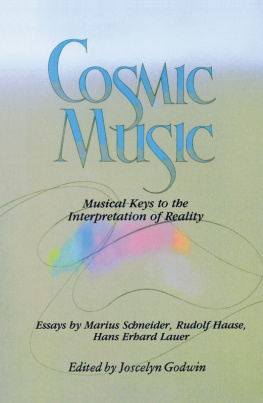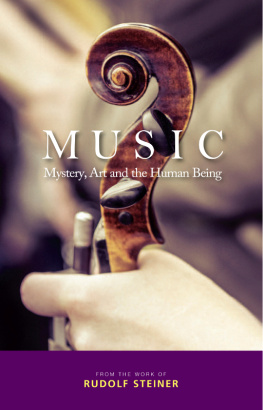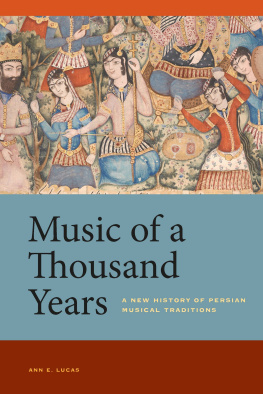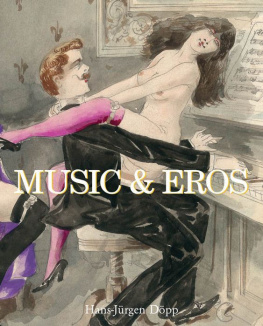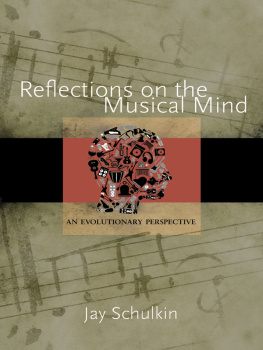
COSMIC MUSIC

Musical Keys to the Interpretation of Reality
essays by
Marius Schneider
Rudolf Haase
Hans Erhard Lauer
edited, with an Introduction, by
JOSCELYN GODWIN
(Professor of Music, Colgate University)
translated by
MARTON RADKAI
and JOSCELYN GODWIN

INNER TRADITIONS
Rochester, Vermont
Inner Traditions International
One Park Street
Rochester, Vermont 05767
Copyright 1989 by Joscelyn Godwin
All rights reserved. No part of this book may be reproduced or utilized in any form or by any means, electronic or mechanical, including photocopying, recording, or by any information storage and retrieval system, without permission in writing from the publisher.
Library of Congress Cataloging-in-Publication Data
Schneider, Marius, 1903
Cosmic music : musical keys to the interpretation of reality : essays / by Marius Schneider, Rudolf Haase, Hans Erhard Lauer; edited with an introduction by Joscelyn Godwin; translated by Marton Radkai and Joscelyn Godwin.
p. cm.
Includes bibliographies and index.
ebook ISBN 978-162055094-6
print ISBN 978-089281070-3
ISBN 0-89281-070-X
1. MusicPhilosophy and aesthetics. 2. Harmony of the spheres.
I. Haase, Rudolph. II. Lauer, Hans Erhard.
III. Godwin, Joscelyn. IV. Title
ML3800.S2588 1987
780.1dc19 88-9605
CIP
This book contains translations of Die Natur des Lobgesangs, Klangsymbolik in Fremden Kulturen Marius Schneider Harmonik und Heile Uberlieferung, Fortsetzungen der Keplerischen Weltharmonik, Keplers Weltharmonik und Ihre Bedeutung Fur Die Gegenwart Rudolf Haase Mozart und Beethoven im Entwicklungsgang der Abendldndischen Kultur, Die Entwicklung der Musik im Wandel der Tonsysteme Hans Erhard Lauer
INTRODUCTION
WHAT is the cosmos? Perhaps the word summons up before the minds eye a vision of dark and terrifying spaces, of dimensions and times surpassing understanding, apparitions of unearthly beauty: cold white galaxies, warmly colored planets, suns without number. It is a place of supreme mystery, where the relative security of earth is left behind, the climate is hostile to every form of life as we know it, and even matter ceases to behave predictably. On its fringes lurk the bizarre imaginings of science fiction, apparently to be gradually realized like a bad dream coming true.
This picture of the cosmos which so many people share today reflects the aspirations and fears of modern humanity at the very end of a world cycle; and like every other epoch, this one has formed its worldview largely in its own image: not in the image of its physical body, but in an image that reflects what it has made of the human mind. Where once gateways opened to the heavens, now there gape black holes, ready to swallow everything into oblivion. Such is the view many people hold of death: a doorway to the extinction of consciousness. Where once the planetary angels guided their astral chariots, now mindless forces propel stars and planets inexorably to their doom. And the creative song or word of God is reduced pitifully to a big bang.
To the Greeks, the word kosmos originally suggested none of these facts or fancies, but rather something orderly, decorative, and neatly arranged. Like many ancient root words, it opens a window onto a very different view of the cosmos: one that revealed it as a divine ornament. The heavens appeared to ancient civilizations as artistically arranged, regular and predictable, pleasing to eye and mind. In Latin the corresponding word mundus also carries overtones of cleanliness and elegance, suggesting a state of affairs far different from that of our dirty and disorderly planet. Not only is the universe exactly as it is designed to be, but so beautiful and ingenious a phenomenon can only be the handiwork of a supreme artist. If the cosmos seems hostile to mankind, that is only through special circumstances known to the science of astrology. That it should be hostile to lifeas they knew itis absurd. For where could life be more lively, intelligence more keen, than in the rarefied and unconstricting atmosphere of the heavens? Where could one hear music more beautiful than that of the spheres and their guiding angels, the Sirens?
What our difficult and threatening times need, more than anything else, is a revolution in cosmology: a complete revision of the way in which educated people have been trained to regard their cosmic environment. Only after this can those other changes take place on earth for which every responsible person longs. The authors of this book are well aware of this. Each in his own way has made that cosmological revolution, and they invite us to do likewise. But the revolution they propose is even more radical than that of Copernicus, Kepler, and Galileo, which only exchanged one picture for anotherthe sun-centered for the earth-centered. What is now demanded is that the ear again be given precedence over the usurping eye: that tone, not diagrams or words, be acknowledged again as the truest reflection of reality, and hearing honored as the sense through which we can best learn of its nature.
Every music lover knows intuitively that music embodies a certain truth, but few go so far as to obey this intuition and search for truth by way of music. Most people accept that truth belongs by rights to science, religion, or philosophy, while the arts, vital as they are to a fully human life, are still only matters of opinion and taste. We propose on the contrary to take literally Beethovens dictum that Music is a higher revelation than all wisdom or philosophy. Accordingly, to penetrate the mysteries of music is to prepare for initiation into those fathomless mysteries of man and cosmos. Ones discoveries will be pregnant with implications for every department of life: that much will be plain to anyone who reads these essays.
Our three principal authors are concerned with reviving the ancient discipline of Musica Speculativa, of music as a mirror (Latin: speculum) held up to reality. Marius Schneiders approach is through re-creating the musical cosmogony of archaic civilizations. Rudolf Haase demonstrates that harmonic principles are empirically present throughout the universe. Hans Erhard Lauer uses music to illuminate and explain the changes that have taken place in the evolution of human consciousness. Cosmic Music is their theme, but it can mean different things. For Schneider it is the song with which the gods and primordial man greet the emergence of a new world: a song that resounds through all of creation, planets, animals, plants, and stones, and forms the musical instruments with which individual man responds to it. For Haase, cosmic music is the law of harmonics that prints its signature on all things, recognized in the past by philosopher-scientists such as Pythagoras and Kepler, but needing a veritable new science to recast it for the modern mind. (To supplement Haases essays, we include the extracts from Johannes Kepler on which they build.) For Lauer, it is the song of the gods in their starry spheres, heard there by archaic man before his descent into the physical body: it is the wellspring of all human music, its expression varying as man journeys through the cycles of world history.
Why should such a book consist entirely of translations from German-speaking authors? One can only answer this question with another: Why do German-speaking composers predominate on classical concert programs? It is simply the case that most current work in speculative music appears in German, whether from Switzerland (Lauer and other anthro-posophists), Austria (Haase and his pupils), or Germany itself. Perhaps it is their rich heritage of
Next page
